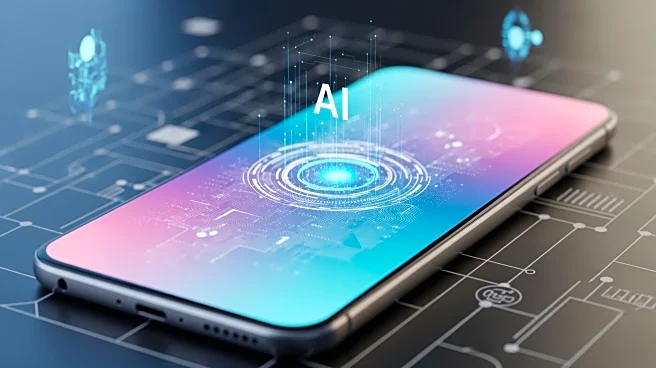What's Happening?
OpenAI has introduced its Sora app to Android users, expanding access to its AI video generation technology. Previously available only on iOS, Sora allows users to create AI-generated videos featuring their own likeness and voice. The app functions similarly
to popular short-form video platforms like TikTok and YouTube Shorts, offering a vertical feed of AI-generated content. Users can scan their facial features using their phone's selfie camera, enabling them to star in AI-generated videos. The app's Cameo feature allows for quick facial scanning and video creation, with users able to generate up to 30 videos per day. Sora is currently available to users in the U.S., Canada, South Korea, and Japan, with plans to expand further.
Why It's Important?
The launch of Sora on Android signifies a major step in the accessibility of AI-driven content creation tools. By allowing users to insert themselves into AI-generated videos, OpenAI is pushing the boundaries of personal content creation and social media interaction. This development could impact the way individuals engage with digital content, offering new opportunities for creativity and self-expression. However, it also raises questions about privacy and the ethical use of personal likenesses in AI-generated media. As AI technology continues to evolve, platforms like Sora may influence the future of social media and digital entertainment, potentially reshaping user experiences and content consumption patterns.
What's Next?
As Sora becomes more widely available, OpenAI may face challenges related to privacy concerns and the ethical implications of AI-generated content. The company will likely need to address issues surrounding the use of personal data and likenesses, ensuring user consent and protection. Additionally, OpenAI may explore further enhancements to the app's features, such as expanding its capabilities to include more interactive and immersive experiences. The reception of Sora by users and its impact on the social media landscape will be closely monitored, potentially influencing future developments in AI-driven content creation.
Beyond the Headlines
The introduction of Sora highlights the growing intersection between AI technology and personal identity in digital spaces. As users engage with AI-generated content featuring their own likeness, questions about authenticity and the nature of digital self-representation arise. This development may prompt discussions about the role of AI in shaping personal narratives and the potential for AI to blur the lines between reality and virtual experiences. The ethical considerations surrounding AI-generated media will likely become more prominent as technology advances, necessitating thoughtful discourse on the implications for society and individual identity.
















